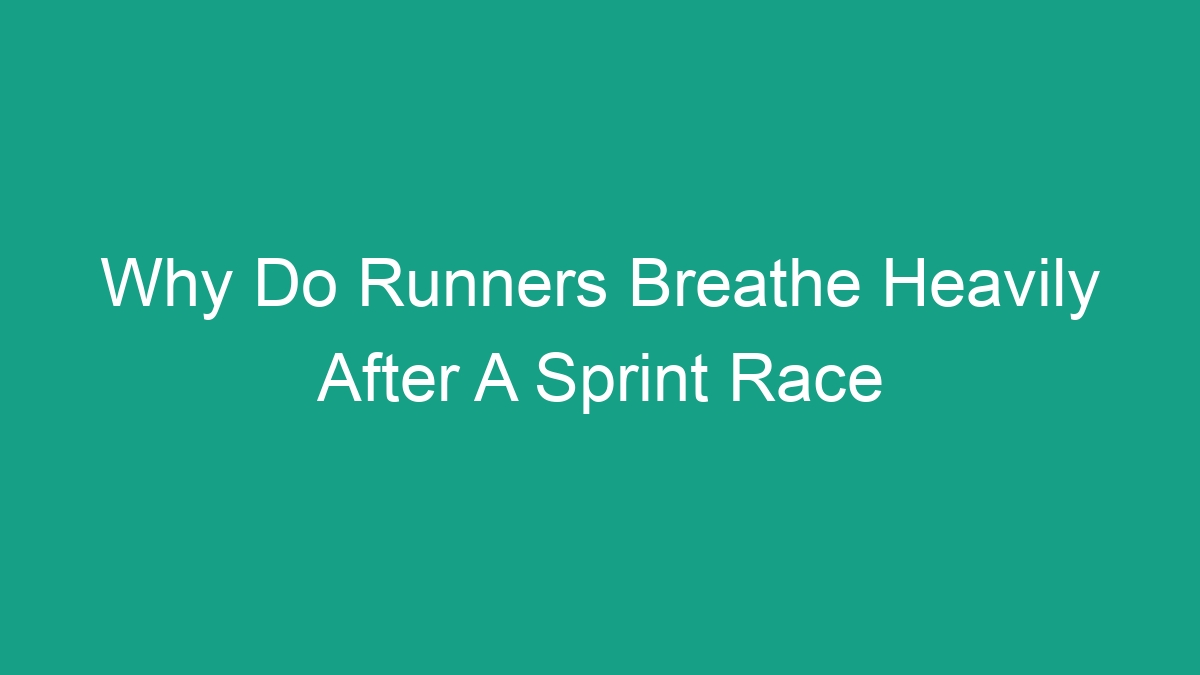
When you watch a sprint race, whether it’s a short-distance race on the track or a quick sprint to the finish line in a marathon, one thing you’ll notice is the heavy breathing of the runners afterwards. But have you ever wondered why runners breathe heavily after a sprint race? In this article, we’ll explore the physiological reasons behind this phenomenon and how it affects runners.
What Causes Heavy Breathing After A Sprint Race?
After a sprint race, the body is in recovery mode, and heavy breathing is one of the ways it adapts to the intense physical exertion it has just undergone. Several factors contribute to heavy breathing after a sprint race:
- Aerobic and Anaerobic Respiration: During a sprint race, the body relies on both aerobic and anaerobic respiration to produce energy. Aerobic respiration requires oxygen and is the body’s preferred method of producing energy for longer, moderate-intensity activities. Anaerobic respiration, on the other hand, kicks in during high-intensity, short-duration activities when the body cannot supply enough oxygen to meet the demands of the muscles. After the sprint race, the body continues to consume oxygen at an elevated rate to repay the “oxygen debt” accumulated during anaerobic respiration. This increased oxygen consumption results in heavy breathing as the body works to restore its oxygen levels to normal.
- Lactic Acid Build-Up: During intense exercise, such as sprinting, the body produces lactic acid as a byproduct of anaerobic metabolism. The accumulation of lactic acid in the muscles can lead to muscle fatigue and soreness, causing the body to breathe heavily in an effort to clear the lactic acid from the muscles and restore a normal pH balance.
- Elevated Heart Rate: Sprinting raises the heart rate to near-maximum levels, and heavy breathing after a sprint race helps the body supply oxygen to the muscles and remove carbon dioxide and other waste products from the body.
Effects of Heavy Breathing on Runners
Heavy breathing after a sprint race affects runners in several ways:
- Recovery: Heavy breathing is a vital component of the recovery process after a sprint race. It helps the body replenish oxygen levels, clear lactic acid from the muscles, and restore normal respiratory and heart rates.
- Muscle Soreness: Despite the discomfort it causes, heavy breathing plays a role in reducing muscle soreness by aiding the removal of waste products from the muscles.
- Performance: Proper breathing techniques during the recovery phase can assist runners in managing their fatigue and preparing for subsequent races or training sessions.
Training and Conditioning for Improved Breathing
Proper training and conditioning can help runners improve their breathing techniques and adapt to the physiological demands of sprint races:
- Aerobic Training: Engaging in regular aerobic training, such as long-distance running, cycling, or swimming, can improve the body’s overall respiratory efficiency, making it easier for runners to recover post-race.
- Breathing Exercises: Incorporating specific breathing exercises, such as diaphragmatic breathing and controlled breathing techniques, can enhance lung capacity and respiratory muscle strength, leading to more efficient breathing during and after a sprint race.
- Strength Training: Developing muscular strength and endurance, especially in the respiratory and core muscles, can contribute to better posture, breathing control, and overall performance during sprint races.
FAQs
Q: How long does it take for heavy breathing to subside after a sprint race?
A: The duration of heavy breathing post-sprint race varies depending on individual fitness levels, race intensity, and environmental factors. Generally, it may take anywhere from a few minutes to 30 minutes for breathing to return to normal.
Q: Can heavy breathing after a sprint race lead to respiratory issues?
A: While heavy breathing post-sprint race is a natural response to intense physical exertion, it is essential to monitor breathing patterns and seek medical attention if excessive or prolonged heavy breathing is experienced, as it could indicate underlying respiratory issues.
Q: Are there breathing techniques that can help runners recover faster after a sprint race?
A: Yes, deep breathing, focusing on exhaling fully to expel carbon dioxide, and maintaining a relaxed breathing rhythm can aid in faster recovery post-sprint race. Incorporating regular breathing exercises and mindfulness practices can also contribute to improved breathing and recovery.
Q: How does heavy breathing post-sprint race impact oxygen consumption?
A: Heavy breathing post-sprint race increases oxygen consumption as the body works to repay the oxygen debt accumulated during anaerobic respiration. This elevated oxygen consumption aids in clearing lactic acid from the muscles and restoring the body’s oxygen levels to normal.



